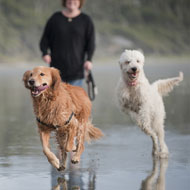Dogs domesticated earlier than first thought

Experts believe that the study might explain the deep bond between dogs and humans.
Dogs separated from wolves earlier than first thought, according to a new study.
The study, published in Current Biology, suggests that dogs may have separated from wolves at least 27,000 years ago.
The findings challenge previous studies inferring that dogs were domesticated more recently, around 11,000 - 16,000 years ago.
In the study, scientists analysed DNA from a small bone found on the Russian Taimyr Peninisula in Northern Siberia. The bone was radiocarbon dated to be 35,000 years old.
The team identified the rough genetic code of the bone, and were surprised to find that that its DNA was half way between a dog and a wolf. The results imply that the dogs and wolves separated a few thousand years later.
Speaking to BBC News, Dr Love Dalen, lead author of the study, said that dogs were either domesticated at that time, or the population split into modern wolves and a wild ancestor of modern dogs that later became extinct.
"We think the simplest explanation is that dogs were domesticated at the time of the split," he said.
Experts also believe that the study might also explain the deep bond between dogs and humans.
Peter Smith, chief executive of the Wildwood Trust in Kent told BBC News: "[The study] is showing that the deep, deep connection has existed between man and wolves - now our dogs - for many tens of thousands of years and that is why we love dogs so much. They are part of our own evolution into a modern society."



 The RCVS has announced a new version of its 1CPD mobile app, with enhanced features for veterinary surgeons and veterinary nurses to record their continuing professional development.
The RCVS has announced a new version of its 1CPD mobile app, with enhanced features for veterinary surgeons and veterinary nurses to record their continuing professional development.